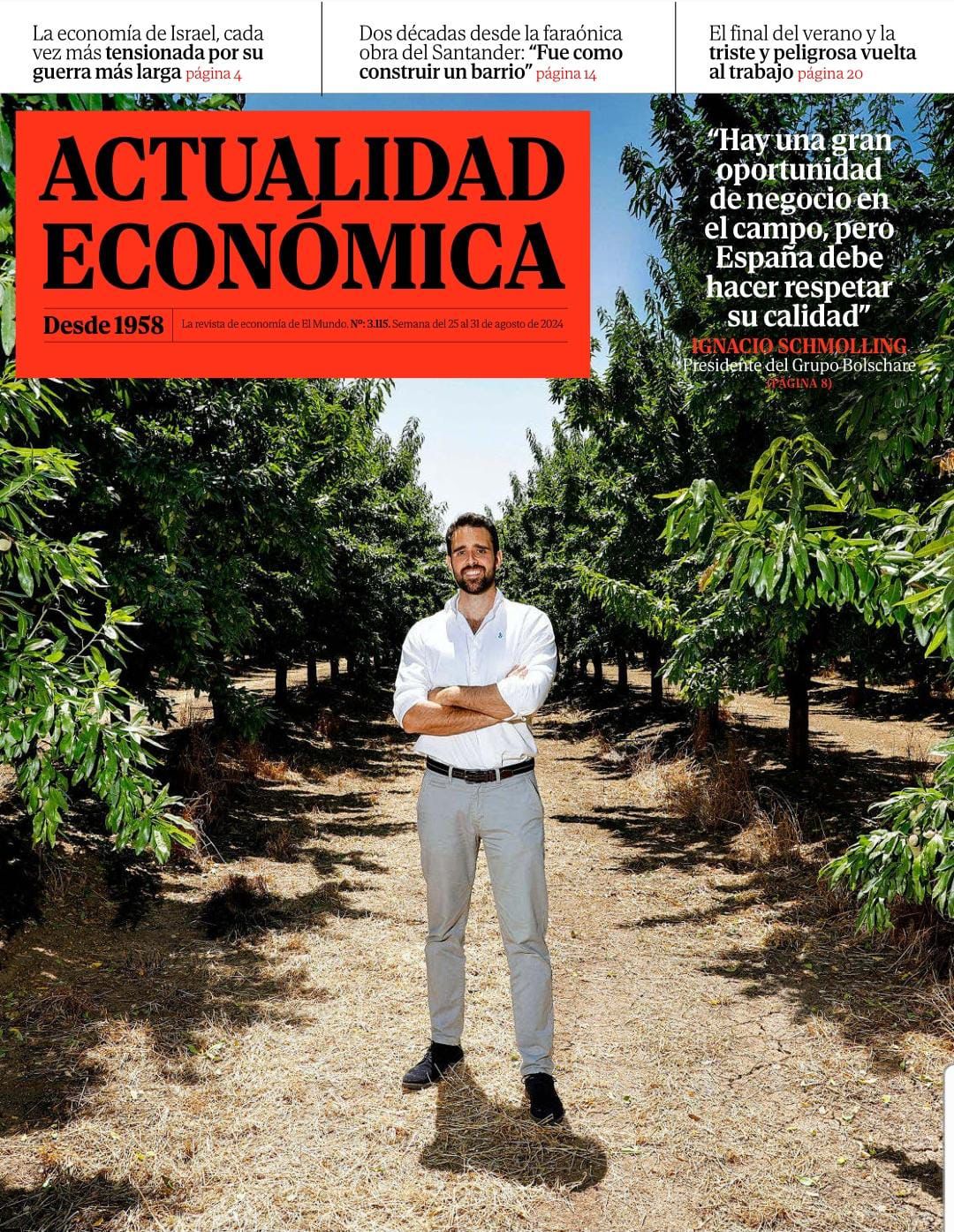The Chairman of the Bolschare Group, Ignacio Schmolling, has given an interview to the Actualidad Económica magazine of the newspaper El Mundo, in which he reviews the current situation of the agricultural sector and of the company itself, as well as the projects in which the different divisions of the Group are immersed. In this regard, he highlighted the projection of the Arima technological platform, recently launched on the market.
Schmolling explained the double aspect of Arima, aimed on the one hand at managing and recording in real time all the processes that make up agricultural dynamics – of great value with a view to the digital notebook – and on the other at measuring to the millimetre the environmental commitment of companies, sectors and countries. “We measure everything from carbon footprint to water footprint, biodiversity and social action. We measure, report, certify, seek verification with the competent entity and help monetise each of these sustainability parameters,” he said.
In this sense, he highlighted the great potential of Arima in the management of CO2 offsetting for companies through carbon credits, as well as for entities and countries that are being fiscally sanctioned and are also obliged to offset their emissions. “Arima measures all scopes, including direct and indirect actions. It is the only global tool that measures in such detail,” he said.
Schmolling said that the Group has already committed to surveying 22 million hectares. “With Arima, we initially focused on South America and Africa because of the size of the terrain. We are currently the leading agricultural asset management operator in the Iberian Peninsula in the application of ESG criteria and we are going to expand into Italy. We have also set our sights on Australia and California. We want to be leaders in agricultural asset management to demonstrate that the sector can be professionalised and that profitability can and must be combined with responsibility. We offer facilities to everyone around us, from the large investor to the small farmer who needs tools to improve his productivity,” he said in relation to Bolschare’s growth plans.
Regarding Bolschare’s origins, Schmolling recalled how the company was born 10 years ago as a family project driven by a love of the land and agriculture. “My father and I used to spend weekends exploring farms, not just as an investment, but for the enjoyment of being in contact with the countryside. We started with 150 hectares of super-intensive olive groves in Portugal, and soon after, we identified the opportunity to professionalise the sector by applying technology and a responsible methodology,” said Schmolling.
The Group’s president also spoke of other aspects linked to the development of Bolschare, such as the agreements reached with Chinese companies for the export of agro-iberian products to the Asian country or the recent acquisition of the agricultural division of Borges. “Borges is a renowned company, which is why this operation has been even more talked about. The great challenge has been the incorporation of all the personnel, who had been working for a long time on these already planted farms, and helping them to get used to working in the way we do, where we maintain the values of our company”, he argued.
The outlook for the sector was another of the topics addressed in the interview, due to the boom that agribusiness has been experiencing in the global economy over the last few years. “It is a sector that has demonstrated its solidity and its decorrelation with global circumstances. Before, capital was going to sectors such as infrastructure and, today, it has been demonstrated that this sector, once professionalised and with scale, is completely profitable and secure. There is a lot of appetite and a great demand from large foreign institutional funds, for which we are paving the way for them to come and invest in the Iberian Peninsula”, Schmolling reflected.
Finally, the president of the Bolschare Group reviewed the different divisions that make up the holding company, in which, in addition to agriculture and technology, there are others of great strategic value such as Energy, Health, and B-Lab, an R&D&I centre that promotes the development of sport, health, sustainability and agribusiness. He also wanted to highlight the work carried out by the Queen of Peace Foundation, which will be responsible for leading numerous solidarity projects, among them for the full integration of people with disabilities or helping people with illnesses in their healing processes through sport.

